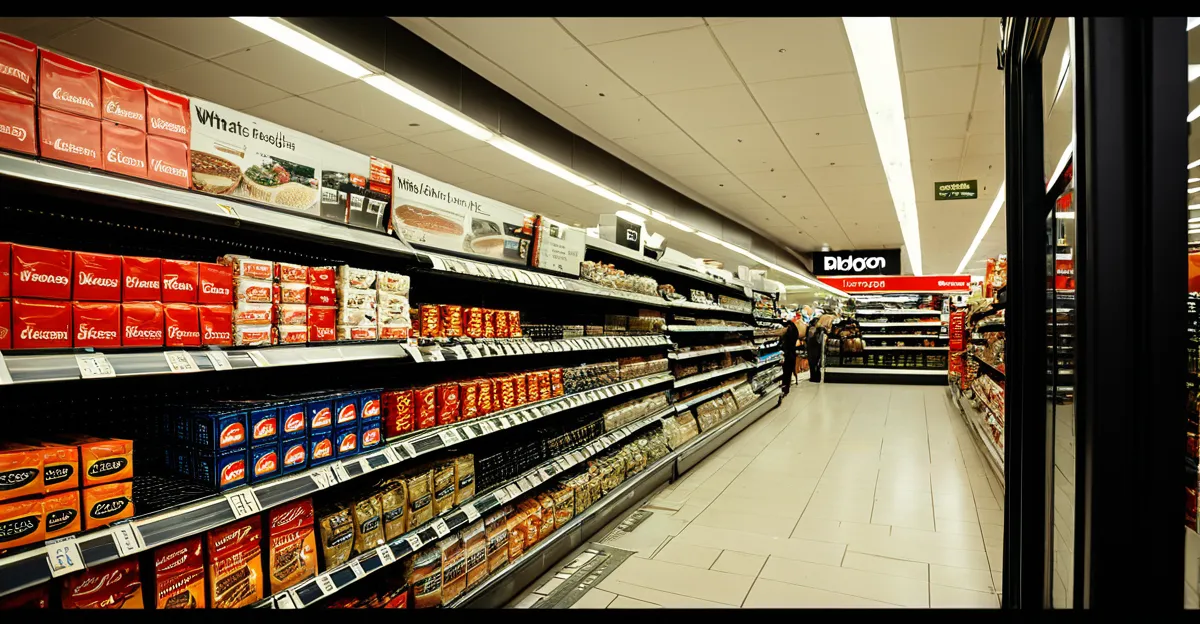Key Challenges Facing the UK Retail Industry Today
The UK retail industry challenges currently reflect a complex interplay of economic pressures and evolving market demands. One of the most pressing current issues is the decline in consumer confidence, primarily driven by inflationary pressures causing tighter household budgets. As consumers become more cautious, spending in the retail sector UK experiences notable contractions, which directly impacts sales volumes and profitability.
Economic data consistently highlights this trend, with retail sales figures showing stagnation or decline in key quarters. This decrease in spending is not uniform; certain sectors within the retail space are more affected due to differences in product types and price sensitivity. Furthermore, the ongoing uncertainties related to global events and domestic economic policies exacerbate this fragile consumer sentiment, leading to fluctuating demand patterns that retailers must navigate.
Topic to read : What Challenges Do UK News Outlets Face in an Era of Digital Transformation?
Another significant challenge is the persistence of inflation in the UK retail environment, which raises the cost of goods and compresses profit margins. Retailers are caught between the necessity to maintain competitive pricing and the unavoidable increase in operational expenses, including rent, wages, and energy costs. This financial squeeze puts strain on business models, especially for smaller retailers who lack the scale to absorb such shocks easily.
These current issues combine with structural shifts in consumer behavior—such as the shift towards digital channels—to create a highly dynamic and challenging landscape for the retail sector UK. Understanding these challenges in detail is essential for devising effective strategies that ensure resilience and growth amid uncertainty.
Also read : How Are UK Journalists Adapting to Digital Transformation?
Cost Pressures: Inflation and Rising Operational Expenses
Inflation within the UK retail sector has significantly impacted product pricing and squeezed profit margins. As wholesale and manufacturing costs rise due to inflation, retailers face the tough choice of passing these increases onto consumers or absorbing them, which strains profitability. The inflation UK retail environment is characterized by this tension, often leading to more cautious pricing strategies or reduced promotional activity.
Aside from product costs, rising retail operational expenses complicate matters further. Key drivers include increased energy bills, higher rent demands, and upward wage pressures—all contributing to the overall expense burden. For many retailers, these cumulative costs are unsustainable without strategic adjustments. Small to mid-size retailers feel these effects most acutely, lacking the leverage to negotiate better terms or invest heavily in efficiency improvements.
Retailers employ several strategies to manage rising costs. These include streamlining supply chains for better cost control, investing in energy-efficient technologies, and re-evaluating staffing models to enhance productivity without compromising customer service. Some retailers also leverage data analytics to optimise inventory and reduce waste, which indirectly eases financial pressures from inflation UK retail encounters. Balancing cost management with maintaining a compelling customer offer remains a delicate task in the face of these persistent challenges in retail operational expenses.
Supply Chain Disruptions and Inventory Management
The UK retail sector continues to grapple with significant supply chain issues that affect the availability and timely delivery of goods. These challenges stem largely from the aftermath of Brexit and ongoing global events, which have introduced new customs procedures, border delays, and transportation hurdles. As a result, many retailers face inventory disruptions that impact product assortment and shelf replenishment, leading to potential sales losses and customer dissatisfaction.
Stock availability remains especially unpredictable, with delays causing shortages in key product lines. These interruptions complicate demand forecasting and inventory planning, increasing the risk of either overstocking or stockouts. The volatility in logistics UK retail operations necessitates agile and dynamic responses, such as diversifying suppliers and adopting advanced inventory management systems.
In addressing these supply chain challenges, retailers are increasingly investing in technology-driven solutions. Real-time tracking and data analytics enable more precise inventory visibility and quicker decision-making. Contingency planning has become a vital part of operations, with strategies including flexible sourcing and enhanced collaboration with logistics providers to mitigate disruptions. These efforts are crucial for maintaining service levels and adapting to the evolving complexities facing the retail sector UK.
Evolving Consumer Behaviour and E-commerce Growth
The retail sector UK is undergoing a profound transformation shaped by a clear consumer behavior shift towards digital engagement. More shoppers now prefer online channels for their purchases, driven by a demand for convenience, speed, and personalised experiences. This preference intensifies e-commerce competition, forcing traditional retailers to rethink their strategies to remain relevant.
How exactly has this shift manifested in the retail landscape? Statistics show a significant rise in online sales as a proportion of overall retail turnover. Brick-and-mortar outlets are seeing footfall decline, especially in non-essential categories, as consumers opt for the ease of shopping on digital platforms. This trend isn’t limited to large retailers; small and mid-sized enterprises must also address the growing trend towards omni-channel presence to capture and retain customers.
In response, the UK retail industry challenges include integrating physical and online channels into cohesive, seamless experiences known as omni-channel retail UK. Retailers are investing in robust digital platforms, click-and-collect services, and personalised marketing. These strategies aim to balance convenience with a high-quality in-store experience, catering to evolving consumer expectations.
Further adding to the complexity is consumer demand for customisation and immediacy. Retailers must leverage data analytics to understand buying patterns and tailor offers accordingly. This enhances loyalty and competes effectively against pure-play e-commerce giants. The rise of mobile commerce and social shopping also underscores the need for agile adaptation.
Thus, the current issues faced here transcend mere channel competition; they redefine how the retail sector UK must engage with customers to survive and thrive in an increasingly digital marketplace.
Labour and Skills Shortages in UK Retail
Labour shortages represent a critical UK retail industry challenge that significantly affects operational capacity and service quality. The retail labour shortages stem from several interlinked factors. Brexit has reduced the pool of available workers, especially from EU countries, who traditionally filled many frontline and seasonal roles. Additionally, ongoing concerns over pay competitiveness and working conditions exacerbate difficulties in attracting and retaining staff within the UK retail workforce.
Recruitment struggles manifest in both entry-level and skilled positions, creating a pronounced skill gap retail sector operators must urgently address. This gap limits stores’ ability to deliver consistent customer experiences and complicates inventory and store management. Retailers face increased turnover rates and rising costs linked to continual hiring and training, adding pressure to already strained margins.
In response, the sector is pursuing multiple strategies to mitigate the labour crisis. These include investing in comprehensive training programs to upskill current employees and reduce reliance on external hires. Automation technologies, such as self-checkout systems and inventory robots, are increasingly adopted to supplement human efforts and improve efficiency. Moreover, some retailers offer enhanced benefits, flexible schedules, and career progression paths to boost retention and appeal to a broader candidate pool.
Addressing retail labour shortages is pivotal for stabilising the retail sector UK and maintaining competitiveness. By combining human resource development with technology and improved working conditions, the industry aims to close the skill gap retail sector currently faces.
Regulatory, Environmental, and Compliance Pressure
The UK retail industry challenges are increasingly shaped by a complex regulatory landscape that demands strict adherence to new government policies and environmental standards. Recent regulatory changes retail impose additional layers of compliance that retailers must navigate, which include evolving tax directives and sustainability mandates designed to reduce environmental impact. These introduce both operational costs and strategic considerations within the retail sector UK.
Environmental compliance has become particularly significant, as retailers face pressure to minimise their carbon footprint, manage waste responsibly, and source products ethically. This shift responds to growing consumer awareness and broader governmental climate commitments. The need to align with environmental compliance requirements can involve investments in green technologies and supply chain adjustments, impacting profit margins but enhancing brand reputation.
Additionally, data protection regulations and consumer rights laws present ongoing compliance challenges. Retailers must rigorously manage customer data to avoid breaches, while ensuring transparent practices in marketing and sales. Failure to meet these standards entails legal risks and potential penalties, compounding the complexity of operating within the UK retail industry.
In sum, adapting to these regulatory and environmental demands is a critical current issue requiring continuous monitoring and proactive strategy. Successful navigation safeguards operational continuity and supports sustainable growth in the competitive retail sector UK.
Future Outlook and Industry Adaptation Strategies
The future of UK retail hinges on how effectively the sector embraces innovation and agile adaptation strategies amid ongoing UK retail industry challenges. To thrive, the retail sector UK must prioritise digital transformation, integrating technology to improve customer experience and operational efficiency. This includes expanding omni-channel retail UK offerings and leveraging data analytics to anticipate trends and personalise interactions.
Industry forecasts suggest that retailers adopting innovation will better withstand economic fluctuations and shifting consumer demands. For example, automation in logistics and inventory management enhances responsiveness and reduces costs, directly addressing supply chain vulnerabilities. Additionally, sustainable practices aligned with environmental compliance not only mitigate regulatory risks but also resonate well with eco-conscious consumers.
Collaboration emerges as a key enabler for resilience. Retailers across the UK are increasingly forming alliances, sharing resources, and investing in joint initiatives such as shared distribution networks or workforce training programmes. These collective efforts help bridge gaps caused by labour shortages and supply chain disruptions.
Ultimately, the success of adaptation strategies depends on proactive leadership and commitment to continuous improvement. By embracing innovation and fostering cooperation, the retail sector UK can transform current challenges into opportunities for sustainable growth and competitive advantage.




